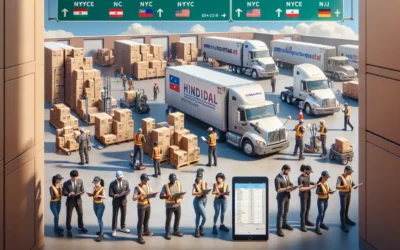The Importance of Streamlining International Relocations for Employees
When a business in NYC or New Jersey decides to move employees across borders, getting it right is crucial. Streamlining international relocations isn’t just about cutting costs. It’s about keeping your team happy and focused. Think about it. Moving countries is a huge deal. You’ve got paperwork, housing, and sometimes even language barriers to think about. If a business makes this process as smooth as peanut butter, employees feel valued and supported. That’s a direct line to better productivity and loyalty. On the flip side, if it’s a mess, you risk not just losing good people but your company’s reputation could take a hit. People talk, especially on platforms like LinkedIn. A streamlined relocation process shows you’re serious about taking care of your team, and that’s the kind of PR you can’t buy. So, investing time and resources into making international moves as seamless as possible is a no-brainer. It tells your team they’re worth the effort and sets the stage for a successful transition abroad.
Understanding the Unique Challenges of NYC and New Jersey Businesses
Relocating employees internationally is not a small task, especially for businesses in NYC and New Jersey. The hustle and bustle of the city don’t pause for anyone’s moving process. One of the biggest challenges these businesses face is navigating through the dense and highly regulated urban environments. The streets of NYC are not just crowded; they’re a maze of regulations, permits, and unexpected delays. New Jersey, with its own set of rules and its proximity to NYC, shares similar hurdles. Businesses need to consider the cost of living adjustments too. Let’s not forget, both places can be pricey. Employees moving from a different state or country might find the cost of living shockingly high. This isn’t just about rent; it’s about daily expenses skyrocketing. Compliance with both states’ laws and international regulations adds another layer of complexity. You’ve got employment laws, tax treaties, and immigration policies to juggle. Making a mistake here isn’t just a small blip; it can derail the entire relocation process. Plus, the competition for talent is fierce. You’re not the only game in town trying to attract top talent from around the globe. Securing housing, understanding local laws, and integrating into a new community can be daunting for the employees you’re moving. It’s more than just a job change; it’s a life change. And let’s be real, the weather. Anyone moving from a milder climate needs to brace for the hot summers and cold, snowy winters. It’s a small but significant adjustment that can impact the settling-in process. So, it’s clear, relocating employees to or from NYC and New Jersey demands a strategic approach tailored to overcome these unique challenges. It’s not impossible, but it requires diligence, planning, and a whole lot of patience.
Selecting the Right International Mover: Tips and Tricks
Choosing the right international mover is not just about flipping a coin; it’s about doing your homework to ensure a smooth transition. Start by getting at least three quotes from reputable companies. Look for movers who are members of the International Association of Movers, showing they stick to certain quality standards. It’s not just about the lowest price. You want reliability and experience, especially for moves from NYC or New Jersey to far-off lands. Reviews and referrals can tell you a lot. If a friend had a good experience, that mover might be worth considering. Don’t forget to ask about insurance. Accidents happen, and you want your belongings protected. Lastly, clarity is key. A trustworthy mover will be clear about costs, timelines, and what’s expected from you. Taking these steps can make selecting the right international mover less of a headache.
Preparing Employees for the Big Move: A Checklist
Before employees pack their bags for an international move, businesses in NYC and New Jersey need to ensure their team is ready. Here’s a straightforward checklist to streamline the process:
- Visa and Work Permits: Make sure employees have the right paperwork. This means visas, work permits, and any other required documents for the destination country.
- Cultural Training: Offer sessions to familiarize them with the new culture. This can include language lessons, etiquette guides, and any local customs they should be aware of.
- Financial Preparation: Help them set up a local bank account and understand the cost of living in the new location. They should know what to expect when it comes to expenses.
- Healthcare: Make sure they know what healthcare services are available and whether they need any additional insurance.
- Housing Assistance: Provide support in finding a place to live. Whether it’s connecting them with a real estate agent or giving them resources to search on their own, make sure they have somewhere to stay.
- Relocation Package: Clearly outline what the relocation package includes. This can cover moving costs, travel expenses, housing allowances, and any other support your company offers.
Remember, the goal is to make the transition as smooth as possible for your employees. By tackling these steps, you’re not just moving a workforce – you’re moving people who are the heart of your business. Support them through this big change, and they’ll be ready to hit the ground running in their new home.
Navigating International Moving Regulations and Compliance
When it comes to moving employees across borders, the maze of international moving regulations and compliance can be daunting. But don’t worry, it’s manageable with the right approach. First off, each country has its own set of rules when it comes to work permits and visas. Ensure you’re familiar with the specific requirements of the destination country. Missteps here can lead to delays or refusal of entry, which no one wants.
Next up, tax implications are a big deal. The tax laws for expatriates can be complex, varying greatly from one country to another. It’s crucial to understand both the home and host country’s tax obligations to avoid any legal issues or penalties. A wise move here is consulting with an international tax expert.
Don’t forget about the shipping of personal and household goods. This isn’t just about packing stuff into boxes. It’s about meeting the destination country’s import regulations, which can include restrictions or duties on certain items. Research and planning are key to a smooth transition.
Healthcare is another critical area. Your employees need to know how healthcare works in the new country and what they need to do to ensure they’re covered. Whether it’s continuing their current health insurance internationally or getting a new policy, make sure it’s sorted before they step on the plane.
Lastly, keep in mind cultural training. It’s not just about paperwork and regulations. Understanding and adapting to a new culture is vital for your employees’ success and well-being abroad. Consider providing cultural training sessions to ease their transition.
In short, while navigating international moving regulations and compliance may seem like navigating through a storm, proper preparation, research, and expert advice can guide you safely to shore. It’s all about being proactive and detailed in your approach.
Budgeting for an International Move: Cost-Saving Strategies
When it comes to moving employees internationally, businesses in NYC and New Jersey need to keep their eyes on the budget. It’s easy for costs to skyrocket if you’re not careful. Here’s how you can save money without skimping on quality. First, get multiple quotes. Don’t settle for the first moving company you find. Compare prices and services to ensure you’re getting the best deal. Next, consider timing. Moving during off-peak seasons can significantly lower costs. Also, negotiate everything. From mover rates to shipping costs, most prices aren’t set in stone. Speaking of shipping, be strategic about what you send. It might be cheaper to buy new furniture abroad than to ship large, bulky items. Lastly, don’t forget about tax deductions. Relocating employees might be tax-deductible, which can offset some costs. Stick to these strategies, and you’ll find it’s entirely possible to manage an international move without breaking the bank.
Ensuring Smooth Transition for Employees and Their Families
Making sure employees and their families move smoothly is crucial. It’s not just about packing boxes. It’s about moving lives. Employers should think about housing, schools for kids, and helping families get familiar with their new community. First, offer a relocation package. This can cover moving costs, temporary housing, and even language training if needed. Second, give them local insights. Share info about neighborhoods, schools, and where to find essentials. Finally, keep communication open. Be there to answer questions and help solve any problems. This shows you care, making the move easier for everyone involved.
Leveraging Technology in Managing International Relocations
In the fast-paced world of business, moving employees across borders isn’t just about booking flights and packing boxes. It’s about smart moves, and that’s where technology swoops in. For businesses in NYC and New Jersey, leveraging technology means smoother sailing in the turbulent seas of international relocations. Tools like relocation management software revolutionize how we handle the process. This software keeps track of everything—visa requirements, shipping logistics, housing, and even local orientations. Think of it as a digital relocation assistant that never sleeps. Plus, there’s more. Online platforms offer language training and cultural orientation, helping your employees feel at home anywhere in the world. Digital tools mean you can wave goodbye to the paperwork nightmare and say hello to efficient, streamlined processes. For companies in the business hubs of NYC and New Jersey, integrating these technologies is not just smart; it’s essential for staying ahead in the global game.
The Role of Corporate Relocation Policies in Employee Moves
When a business decides to move an employee across borders, having a solid corporate relocation policy is key. This policy is like a playbook for the whole process. It sets clear guidelines on what the company will cover, from moving costs, housing assistance, to visa support. It’s not just about throwing money at the move. It’s about making sure the employee and their family feel supported throughout this big change. Think of it as the company’s promise to look after its own. For businesses in NYC and New Jersey, this policy can also tackle unique local challenges, like high living costs and complex housing markets. In short, a well-crafted policy can turn a potentially stressful move into a smooth transition. It’s about keeping the employee focused and productive, not bogged down by relocation headaches.
Streamlining the Process: A Summary of Best Practices
When relocating employees internationally, think smart and act strategically. The key is to simplify and streamline. First, always plan ahead. You’re not just moving equipment; you’re moving lives. Start with a solid relocation policy that’s fair but flexible. This sets clear expectations. Next, partner with trusted relocation experts. These pros know the ins and outs of moving across borders and can handle the nitty-gritty, letting you focus on your business. Then, communication is crucial. Keep it open and frequent with your employees. They should never feel in the dark about their move. Also, consider the details like visas, housing, and cultural training. These aren’t just checkboxes; they’re about ensuring your team hits the ground running. Lastly, support your employees’ transition. This isn’t just about logistics. It’s about people. Welcome them into their new environment and provide support for them and their families. Remember, a smooth move boosts morale and productivity, making it a win-win for everyone.




